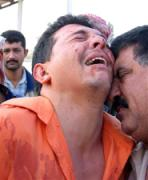Entered into the database on Monday, November 21st, 2005 @ 18:26:24 MST
U.S. troops fearing a car bomb attack fired on a crowded minivan and killed at
least three civilians including a child north of Baghdad on Monday. The U.S. army's 3rd Infantry Division said its troops had opened fire after
first trying to wave the minivan to a stop and then firing warning shots. "These tragedies only happen because Zarqawi and his thugs are out there
driving around with car bombs," said Major Steve Warren, a spokesman for
U.S. forces in Baquba, in reference to the leader of al Qaeda in Iraq, Abu Musab
al-Zarqawi. Two men and a child were killed and three people were wounded, Warren
said. Survivors disputed the military's account, insisting that five family
members, including two children, died and four were wounded as bullets tore
through the van. U.S. and Iraqi authorities are investigating reports that Zarqawi was killed
in a gunfight with U.S. troops in the northern Iraqi city of Mosul on Saturday,
but there has been no confirmation that Iraq's most wanted militant is dead
and U.S. officials said they doubted it was true. The minivan incident highlighted the delicate balance in Iraq, where a insurgency
by Sunni Arabs and foreign fighters against the Shi'ite and Kurdish-led government
and its U.S. backers is intensifying in the buildup to December 15 elections. One of the survivors told Reuters the family had been driving from Balad, a
town about 80 km (50 miles) north of Baghdad, to Baquba for a funeral and had
tried to move over to make way for a U.S. patrol when they were shot at. CHILDREN DEAD Reuters television footage showed two children's bodies in a Baquba morgue
and relatives kissing another body on a morgue trolley. One child's head appeared
to have been blown off. "They are all children. They are not terrorists," shouted an unidentified
relative. "Look at the children," he said. Scores of suicide car bombs have been launched at military and police checkpoints,
as well as convoys and civilian targets, making soldiers wary of any vehicle. In the past few days more than 160 people have died in a spate of suicide car
bombings and other attacks across Iraq, including attacks on Shi'ite mosques
in the northeast and at the funeral of a Shi'ite tribal sheikh near Baquba on
Saturday. Speculation bubbled that Zarqawi, blamed for many of the worst attacks in Iraq,
was among eight insurgents killed in a gunfight in Mosul on Saturday. U.S. Ambassador Zalmay Khalilzad told Reuters in Iraq he did not believe Zarqawi
had been killed. "Of course the days are numbered, we are after him, we are getting closer
to that goal but unfortunately ... we did not get him in Mosul," he said. Iraqi Foreign Minister Hoshiyar Zebari told Reuters after a news conference
in Moscow: "Zarqawi has been active in that city and surrounding areas
but unless they get a confirmation from the DNA it will be difficult to say
whether it was him or some of his lieutenants." Zarqawi claimed responsibility for three hotel attacks that killed more than
50 people in Amman 12 days ago. RECONCILIATION An often discordant reconciliation conference of Iraqis in Cairo was saved
by a compromise. Members of Iraq's Sunni minority, dominant under Saddam Hussein and opposed
to the current government, had argued U.S. occupation was the root cause of
violence and U.S. troops should leave as soon as possible. Mezher al-Dulaimi, a Sunni Muslim from the troubled west of Iraq, said the
three-day, Arab League-sponsored meeting had agreed to the formula: "Resistance
is a legitimate right of all peoples." Iraqi government representatives said the government would end foreign occupation
gradually as Iraq built up its own security forces to replace foreign troops. President Jalal Talabani on Monday became the first head of state for more
than four decades to visit Shi'ite Iran, a deadly enemy under Saddam. He won
assurances Tehran supported Iraq's often unsteady progress toward democracy. There have been accusations that Iran has meddled in postwar Iraq by allowing
weapons and insurgents across its borders. "Such accusations will definitely not affect the expansion of relations
between Iran and Iraq," Iranian President Mahmoud Ahmadinejad told reporters
after meeting Talabani. (With additional reporting by Faris al-Mehdawi in Baquba, Luke Baker in
Baghdad, Twana Osman in Sulaimaniya, Guy Faulconbridge in Moscow, Mohammed Abbas
and Waleed Ibrahim in Cairo and Alireza Ronaghi in Tehran)
